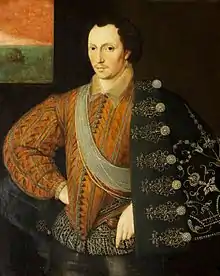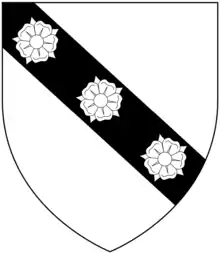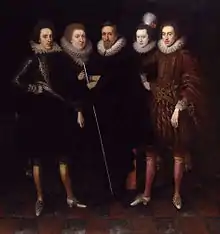Robert Carey, 1st Earl of Monmouth
Robert Carey, 1st Earl of Monmouth (ca. 1560 – 12 April 1639) (or "Cary") was an English nobleman and courtier. He was the youngest son of Henry Carey, 1st Baron Hunsdon, chamberlain and first cousin of Queen Elizabeth I, and Anne Morgan, daughter of Sir Thomas Morgan and Anne Whitney.
Robert Carey, 1st Earl of Monmouth | |
|---|---|
 Robert Carey, 1st Earl of Monmouth, c. 1591 | |
| Born | c. 1560 |
| Died | 12 April 1639 (aged 78–79) |
| Spouse(s) | Elizabeth Trevannion |
| Children | Henry Carey, 2nd Earl of Monmouth Thomas Carey Philadelphia Carey |
| Parents |
|
Biography


As a young man he accompanied several diplomatic missions abroad and took part in military expeditions. In 1587 he joined in the attempt to relieve Sluys. In 1588 he served as a volunteer against the Spanish Armada, and commanded a regiment in the Earl of Essex's expedition to Normandy in support of the Protestant Henry IV of France in 1591, taking part in the siege of Rouen. He was knighted by Essex the same year for having by his intercession with the Queen procured his recall.
In the parliaments of 1586 and 1588 he represented Morpeth; in that of 1593, Callington; and in those of 1596 and 1601, Northumberland. From 1592 till the end of Elizabeth's reign he occupied various posts in the government of the Scottish borders, being appointed Warden of the Middle March in 1596, which he held till February 1598.
This was some of the most important work of his life, and he was largely responsible for easing the troubles and the depredations of the Border Reivers. His conflict with the Scottish fyrebrande Robert Ker, 1st Earl of Roxburghe was only settled after great skill and tact on Carey's part.
In March 1603 he visited the court, and witnessed Queen Elizabeth I's last illness, which he described in his memoirs. Anxious to recommend himself to her successor James I, and disobeying the orders of the council, he started on horseback immediately after the Queen's death on the morning of 24 March 1603, in order to be the first to communicate the tidings to James. He arrived at Holyrood late on 26 March, and was appointed by the King a Gentleman of the Bedchamber. But his conduct met with general disapproval and merited censure as "contrary to all decency, good manners and respect," and on James's arrival in England he was dismissed from his new post.
On 23 February 1605, however, he was made governor of Prince Charles. Carey's wife, Elizabeth Trevanion (not Aletta Hogenhove who was the wife of his nephew Sir Robert Carey), a lady in waiting to Anne of Denmark, was responsible for the early training of the weak, stammering Charles.[1] She taught the Prince, a late-developer, to walk and talk at the age of three, and was close to him throughout his life. Upon her husband's accession to the peerage, she became known as Dame Robert Carey, and is said to be the "Old Dame Dob" referred to in the Jack and Jill nursery rhyme, for her ministrations to the "bruised" King Charles I after his plan to raise revenue by lowering the volume of liquid in the jack (1/2 pint) and gill (1/4 pint) was foiled by publicans by simply making up the difference (up to the 1/2 pint line that is marked by a crown on pint glasses) with water.[2]
In 1611, he was made the Master of the Robes to the Prince, in 1617 his Chamberlain, and on 6 February 1622, he was created Baron Carey of Leppington. In 1623 he followed Charles in his visit to Philip IV of Spain. Following Charles' succession to the throne he was created Earl of Monmouth in 1626. In 1621 he sat in Parliament for the last time as MP for Grampound.
He died on 12 April 1639. His eldest son by Elizabeth Trevannion, Henry Carey, 2nd Earl of Monmouth (1596–1661) succeeded him, and on his death without surviving male issue the peerage became extinct.
His Memoirs were published first by John Boyle, 5th Earl of Cork in 1759. A second edition, annotated by Sir Walter Scott, was printed in 1808.
A new edition was published in 2005, ISBN 1-904466-29-X. The Stirring World of Robert Carey: Robert Carey's Memoirs 1577-1625.
Family and issue

Robert Carey married Elizabeth Trevannion, the daughter of Sir Hugh Trevannion and Sybilla Morgan, on 20 Aug 1593. They were first cousins, with Robert's mother Anne, being the elder sister of Sybilla. They had three children:[3][4]
- Henry Carey, 2nd Earl of Monmouth (1596–1661)
- Thomas Carey (1598–1634). Thomas married Margaret Smith, daughter of Thomas Smith.
- Lady Philadelphia Carey (died in c. 1654/5), married to Sir Thomas Wharton. She was the mother of the 4th Baron Wharton.
Historical fiction
Patricia Finney, writing as P.F. Chisholm, has written a series of historical mysteries featuring Sir Robert Carey, set during his time as Deputy Lord Warden of the Marches.
- A Famine of Horses (1994)
- A Season of Knives (1995)
- A Surfeit of Guns (1996)
- A Plague of Angels (1998)
- A Murder of Crows (2010)
- An Air of Treason (2014)
- A Chorus of Innocents (2015)
- A Clash of Spheres (2017)
- A Suspicion of Silver (2018)
An elderly Robert Carey, supposedly speaking in 1626, narrates portions of George Garrett's novel ‘'The Succession'’.
Notes
References
 This article incorporates text from a publication now in the public domain: Chisholm, Hugh, ed. (1911). "Monmouth, Robert Carey, 1st Earl of". Encyclopædia Britannica. 18 (11th ed.). Cambridge University Press.
This article incorporates text from a publication now in the public domain: Chisholm, Hugh, ed. (1911). "Monmouth, Robert Carey, 1st Earl of". Encyclopædia Britannica. 18 (11th ed.). Cambridge University Press.- Stephen, Leslie, ed. (1887). . Dictionary of National Biography. 9. London: Smith, Elder & Co.
- Loomie, A. J. "Carey, Robert, first earl of Monmouth (1560–1639)". Oxford Dictionary of National Biography (online ed.). Oxford University Press. doi:10.1093/ref:odnb/4656. (Subscription or UK public library membership required.)
| Political offices | ||
|---|---|---|
| Preceded by The Lord Eure |
Custos Rotulorum of Northumberland 1598–bef. 1605 |
Succeeded by Lord Edward Talbot |
| Preceded by The Earl of Essex |
Lord Lieutenant of Staffordshire 1627–1629 |
Succeeded by The Earl of Essex |
| Parliament of England | ||
| Preceded by Thomas St Aubyn Francis Barnham |
Member of Parliament for Grampound 1621–1624 With: John Hampden |
Succeeded by John Mohun Richard Edgcumbe |
| Peerage of England | ||
| New creation | Earl of Monmouth First creation 1626–1639 |
Succeeded by Henry Carey |
| Baron Carey of Leppington 1622–1639 | ||